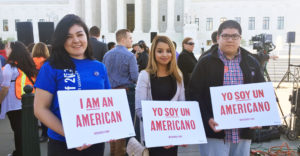The Ties That Bind
THE TORCH: CONTENTSBy Alvaro Huerta, NILC staff attorney
JULY 19, 2016
There’s an oft-quoted aphorism about the United States Supreme Court written by the late Justice Robert H. Jackson: “We are not final because we are infallible, but we are infallible only because we are final.”
The words reflect Justice Jackson’s recognition that the Supreme Court is the final arbiter of vexing national questions, not because the justices of the Court are always right, but because they get the final say.
Yet, in one of the most significant cases before the tribunal this term, the Supreme Court passed the buck. In United States v. Texas, a case examining the Executive’s ability to exercise prosecutorial discretion to defer the deportation of immigrants with strong ties to our country, the Court could not garner a majority. Due to the death of Justice Antonin Scalia earlier this year, the Court currently has only eight justices. The result: a handful of 4–4 tie votes and the uncertainty that comes with inconclusiveness.
The 4–4 tie in Texas resulted in an order from the Supreme Court that reads, in full, “The judgment is affirmed by an equally divided Court.” This solitary, nine-word sentence dashed the hopes of millions — immigrants and their citizen family members — who anxiously await clarity about their fate in this country.
The Court failed them. It failed all of us.
But is the Supreme Court to blame? The Senate has gone a record-breaking 125 days without granting a hearing to determine whether President Obama’s nominee to replace Justice Scalia is fit to serve on the nation’s highest court. That is downright shameful.
Neither infallible nor final, the Texas nondecision was a striking disappointment. And, more than any other case this year, Texas showed how the Court — without the full complement of its nine justices — has had its hands tied by Congress. The Supreme Court, like the country, seems a house divided.
But it wasn’t always this way. The Court has managed to decide a number of major, groundbreaking cases with five of nine justices carrying the day. Important civil rights, many of which we now take for granted, have been won by what might feel like the skin of their teeth.By 5–4 decisions, the Supreme Court has established a suspect’s right against self-incrimination (Miranda v. Arizona), the ability of universities to diversify their student bodies (Regents of the University of California v. Bakke), and the right to marry the person you love (Obergefell v. Hodges).
The Court also split 5–4 in National Federation of Independent Business v. Sebelius, which upheld major provisions of the Affordable Care Act and thereby allowed millions of Americans to keep the health insurance they need to live healthy and productive lives.
To be sure, many of our most treasured civil rights have been established by stronger majorities. But the Court has proven time and again that, when it’s at its full nine-justice capacity, it can get the job done. And the recognition of these inalienable rights has moved our country forward along the path toward justice.
We need a full Court in order for justice to be realized. The Senate must fill the vacancy left by Justice Scalia’s death more than five months ago. As the 4–4 tie in Texas proves, the political dog-and-pony show currently playing itself out in the Senate and being pushed by Republicans who will go to great lengths to stymie the president’s nominee has tied the hands of the Supreme Court. Justice, and all of us, suffer for it.
There’s a silver lining, at least when it comes to the Texas case. The Department of Justice has requested that the Court rehear the case. With any luck, the Court will grant the request and bring much-needed resolution to an issue that affects the whole country. But without a ninth justice, the Supreme Court is in danger of finding itself bound by further ties, and more nondecisions are sure to result.
Justice should not be left undone by stalemate. The stakes are far too high and the political maneuvering has hit a disappointing new low. It’s time for the Senate to do its job so that nine Supreme Court justices can do theirs.






